
 Olivia Møller
Freediver - Activist - Explorer
Olivia Møller
Freediver - Activist - Explorer

 Olivia Møller
Freediver - Activist - Explorer
Olivia Møller
Freediver - Activist - Explorer
Nestled in the North Atlantic Ocean, midway between Norway and Iceland, lie the Faroe Islands. This archipelago of 18 rugged, volcanic islands is a self-governing territory under the sovereignty of the Kingdom of Denmark. With a population of around 53,000, the Faroese people have a rich cultural heritage, deeply connected to the sea that surrounds them. Among the many traditions that define Faroese culture, one stands out for its notoriety and controversy: whaling, specifically the practice known as "grindadráp."
The Faroe Islands' history is a tapestry of Norse and Celtic influences, dating back to the early medieval period. The islands were first settled by Norsemen in the 9th century, and their descendants form the core of today's Faroese population. The isolation of the islands fostered a strong sense of community and self-reliance, with the sea playing a crucial role in the islanders' survival.
Whaling, or "grindadráp," has been a part of Faroese life for centuries. Historical records of this practice date back to the 16th century, though it is likely that it has been a tradition for much longer. The grindadráp involves the communal hunting of pilot whales, a species that migrates through the North Atlantic in large pods. For the Faroese, this hunt is more than just a means of procuring food; it is a cultural event that reinforces community bonds and ensures the continuation of a tradition handed down through generations.
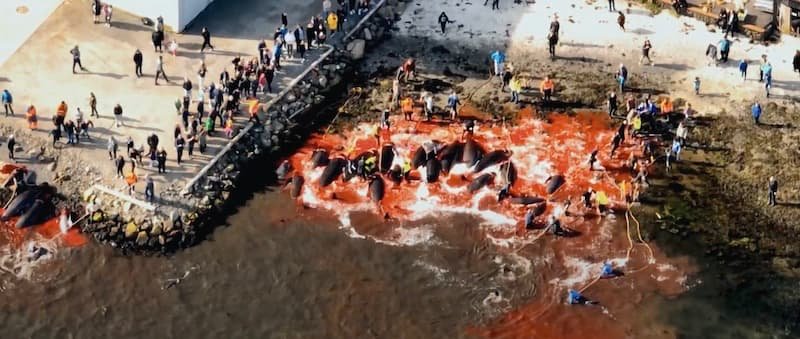
The grindadráp is said to be a highly regulated activity, overseen by Faroese authorities. When a pod of pilot whales is spotted, a coordinated effort ensues to drive the whales towards a designated beach. Using boats, the whales are herded into shallow waters, where they are beached and then killed swiftly. The meat and blubber of the whales are distributed among the local community, with each participant receiving a share according to established customs. This communal sharing reflects the deeply ingrained values of solidarity and cooperation that characterize Faroese society.
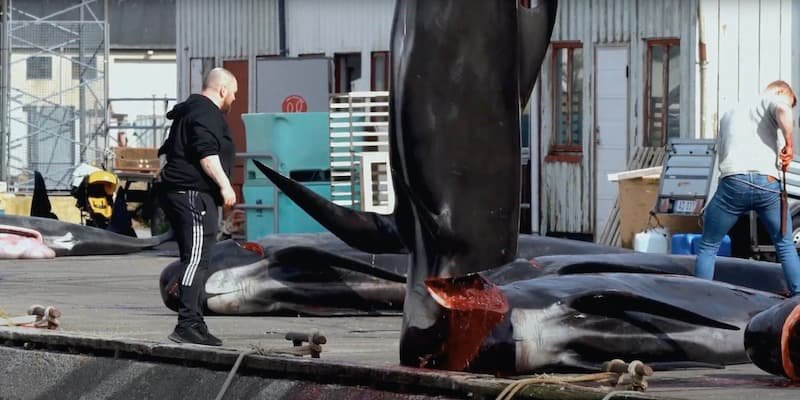
The primary species targeted in the Faroese grindadráp is the long-finned pilot whale (Globicephala melas). These whales are not listed as endangered by the International Union for Conservation of Nature (IUCN), but their population status is still a matter of scientific concern. Estimates suggest that there are around 778,000 long-finned pilot whales in the North Atlantic, with several thousand being killed annually across various hunting regions, including the Faroe Islands.
Other species, such as the Atlantic white-sided dolphin (Lagenorhynchus acutus), have also been hunted in smaller numbers. The total annual catch varies, but in recent decades, it has averaged around 800 pilot whales and a smaller number of dolphins.
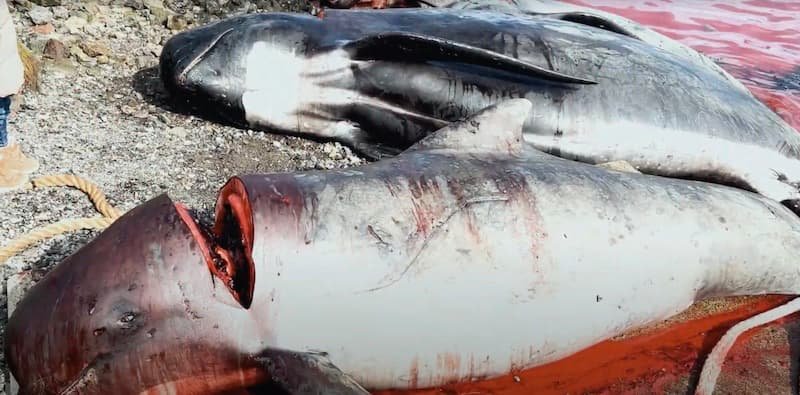
Despite its cultural importance, the consumption of whale meat and blubber poses significant health risks. Research has shown that these products contain high levels of mercury and other environmental pollutants. Mercury, in particular, is a potent neurotoxin that can have severe health impacts, especially on pregnant women and young children. Studies conducted in the Faroe Islands have linked mercury exposure from whale meat consumption to developmental deficits in children and other health issues in adults.
The Faroese government has responded to these findings by issuing dietary guidelines, advising the population to limit their intake of whale meat and blubber. However, these guidelines have had limited impact on reducing consumption, as the cultural attachment to these traditional foods remains strong.
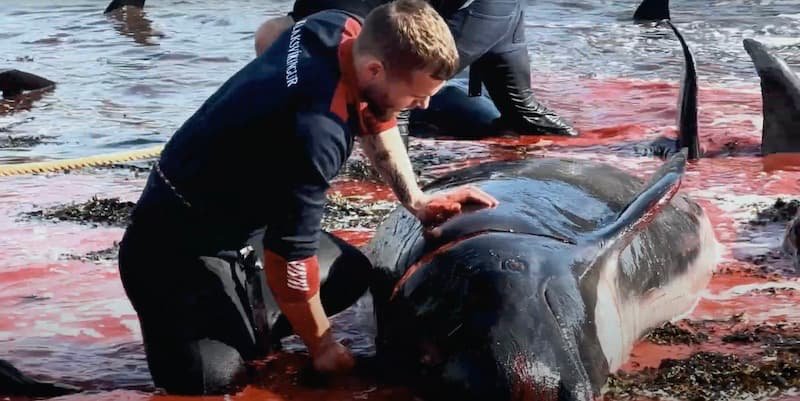
The grindadráp has sparked intense debate both within the Faroe Islands and internationally. Supporters argue that it is a sustainable practice deeply rooted in Faroese culture, providing a valuable source of food for the community. They emphasize that the hunt is conducted with a high degree of regulation and respect for animal welfare, and that it is no different from other forms of sustainable hunting practiced around the world.
Critics, however, contend that the grindadráp is an outdated and inhumane practice that has no place in the modern world. They point to the distressing images of bloodied beaches and argue that such hunts are unnecessary given the availability of alternative food sources. Animal rights organizations and environmental groups have been particularly vocal, calling for an end to the grindadráp on ethical and ecological grounds.
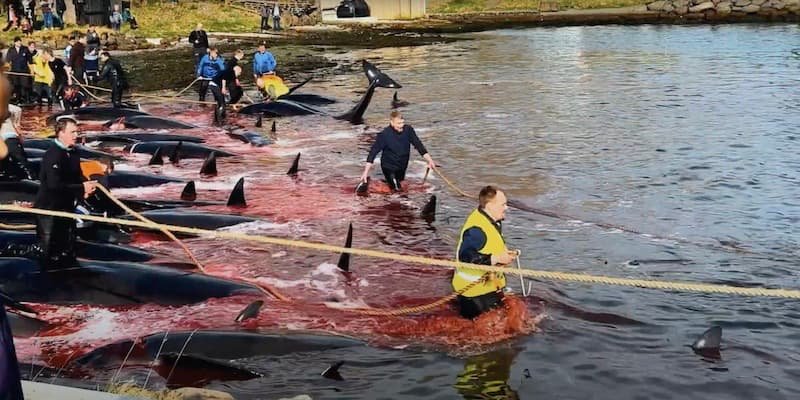
While respecting cultural traditions is important, there are compelling reasons to call for the end of the grindadráp. Firstly, the health risks associated with consuming whale meat and blubber cannot be ignored. The high levels of mercury and other toxins present in these products pose a serious threat to public health, particularly for vulnerable populations such as children and pregnant women.
Secondly, the practice of whaling, even when conducted sustainably, contributes to the global decline of marine mammal populations. Although the long-finned pilot whale is not currently endangered, the cumulative impact of whaling across different regions could have long-term consequences for their populations and the broader marine ecosystem.
Thirdly, the ethical considerations surrounding the treatment of sentient animals cannot be overlooked. Advances in our understanding of animal cognition and social structures highlight the need for greater compassion and respect for all living creatures. The distress and suffering caused to the whales during the hunt are difficult to justify in a world increasingly concerned with animal welfare.
Lastly, the international image of the Faroe Islands is at stake. In an era where global connectivity brings local practices to the attention of a worldwide audience, maintaining traditions that are widely viewed as cruel and unnecessary can harm the reputation of the Faroese people. Embracing change and finding alternative ways to celebrate cultural heritage could enhance the islands' standing in the global community.
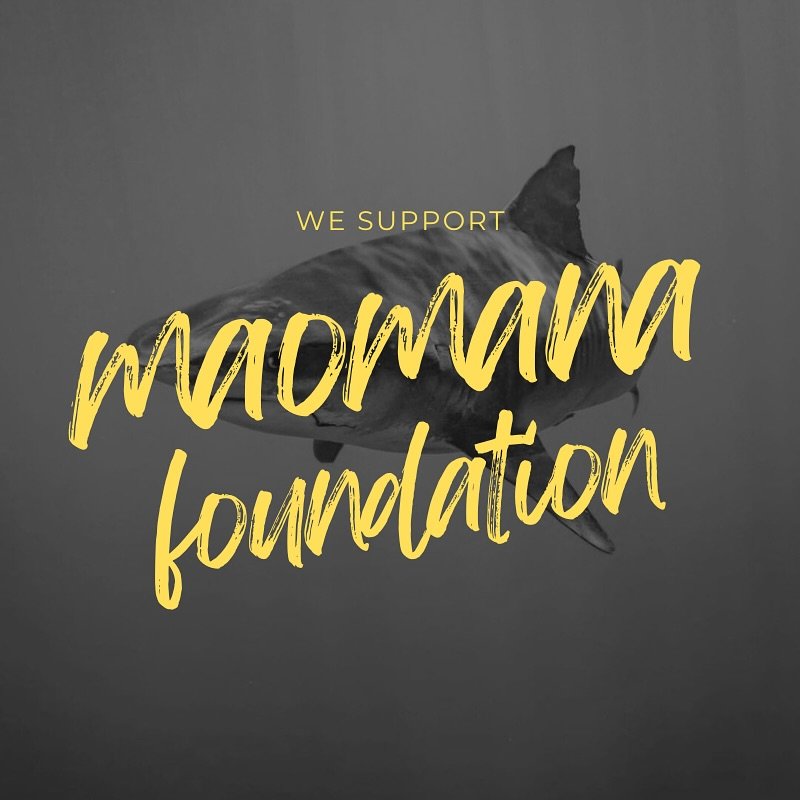
Alchemy Supports The Maomana Foundation
The Faroe Islands, with their stunning landscapes and rich cultural heritage, hold a unique place in the North Atlantic. The grindadráp, a centuries-old whaling tradition, reflects the deep connection between the Faroese people and the sea. However, as the world evolves, so too must our practices and traditions.
While it is essential to honor and preserve cultural identities, it is equally important to adapt to new knowledge and ethical standards. The health risks associated with whale meat consumption, the ecological impact of whaling, and the ethical considerations regarding animal welfare all point towards the need for change.
Respecting cultural differences does not mean turning a blind eye to practices that pose significant risks to health, the environment, and our shared sense of humanity. It is time for the Faroe Islands to lead the way in finding new, sustainable ways to honor their heritage, ensuring that future generations can enjoy the beauty and bounty of the sea without compromising their health or the welfare of the marine life that shares our planet.